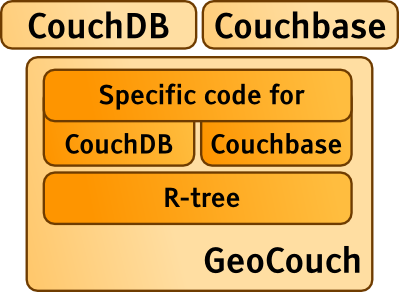The future of GeoCouch and CouchDB
2012-01-06 22:35
The CouchDB world is currently full of “The future of CouchDB” blog posts. It started with the blog post from Damien Katz the creator of CouchDB. Of course people were also concerned about the future of GeoCouch. No worries, it will be good.
The future of Apache CouchDB
The reactions were quite different. People who are not deeply involved with the CouchDB community think that this means the end of Apache CouchDB. My reaction was positive, I tweeted:
“It’s good to see the Damien is so open to [the] world”
The reason was, that for me it was pretty clear that it would happen, and I was just happy that Damien officially made the cut.
The reactions from CouchDB community members where pretty much what Till Klampäckel describes in his blog post. You could see it comming after Couchbase announced that they are not the CouchDB company and that their product won’t be Apache CouchDB compatible.
I agree with Till here, the way Damien wrote his blog post, isn’t the best imaginable. For outsiders, it really seems to be the end of Apache CouchDB, but it is not. For me it just shows, why foundations like the Apache Foundation are such a great idea. Even if the original creator leaves the project, it still lives on.
Apache CouchDB has a lot of contributers and the mailing lists and IRC channel is busy as always. That CouchDB has a future is also shown by the blog post from Cloudant. They will keep supporting Apache CouchDB.
The future of GeoCouch
After this quick recap what happened so far, it’s time to talk about the future of GeoCouch. As you may know, I work for Couchbase on the integration of spatial functionality into their product.
Currently the overlap between Apache CouchDB and the version Couchbase uses internally is still quite huge, but it will diverge more and more in the future. Thus it will get harder and harder to maintain a single version that supports Apache CouchDB and Couchbase.
The good news is, that GeoCouch is pretty much a data structure only. It's an R-tree that stores JSON documents. This can easily be used by CouchDB and Couchbase. Perhaps small wrappers will be needed, but those should be minimal.
The easiest way to understand how the future looks like is in a small illustration:

GeoCouch's core is the R-tree, it's the same code for CouchDB and Couchbase. On top of it there will be code that is specific to either CouchDB or Couchbase.
This means that the majority of the devlopment I do for Couchbase will also improve the GeoCouch you can use for CouchDB.
Conclusion
The future of all three, Apache CouchDB, Couchbase and GeoCouch looks bright.
